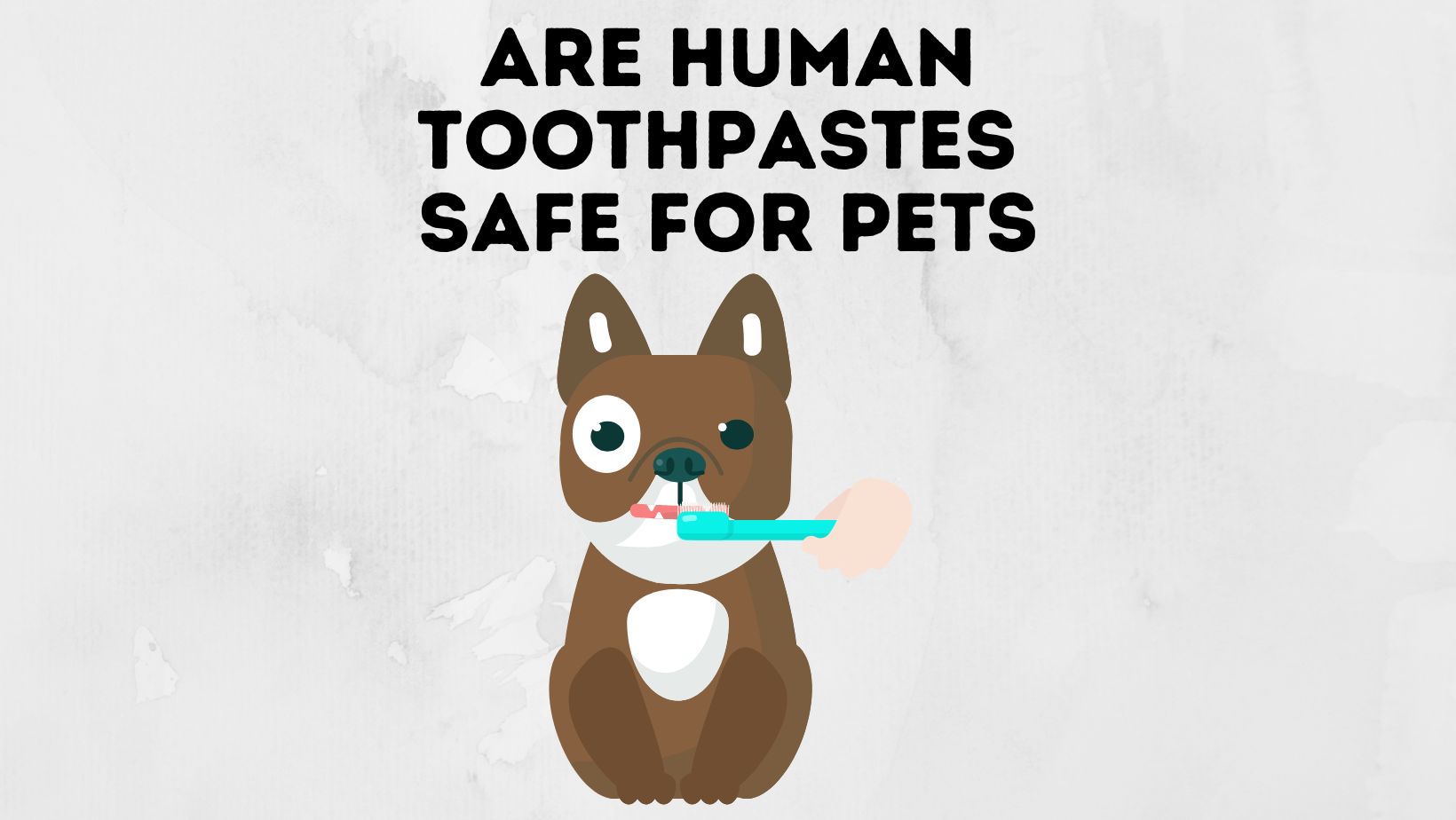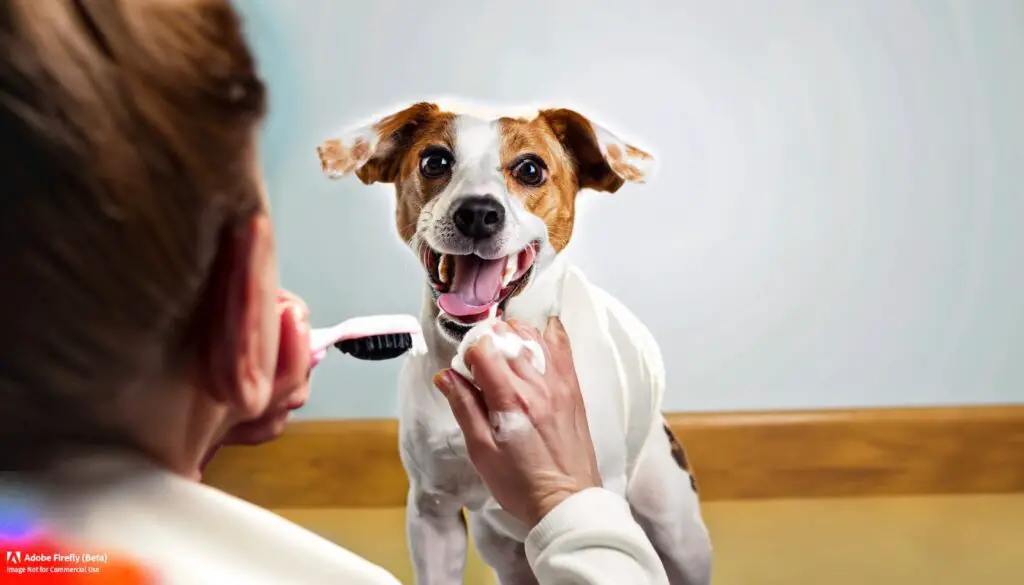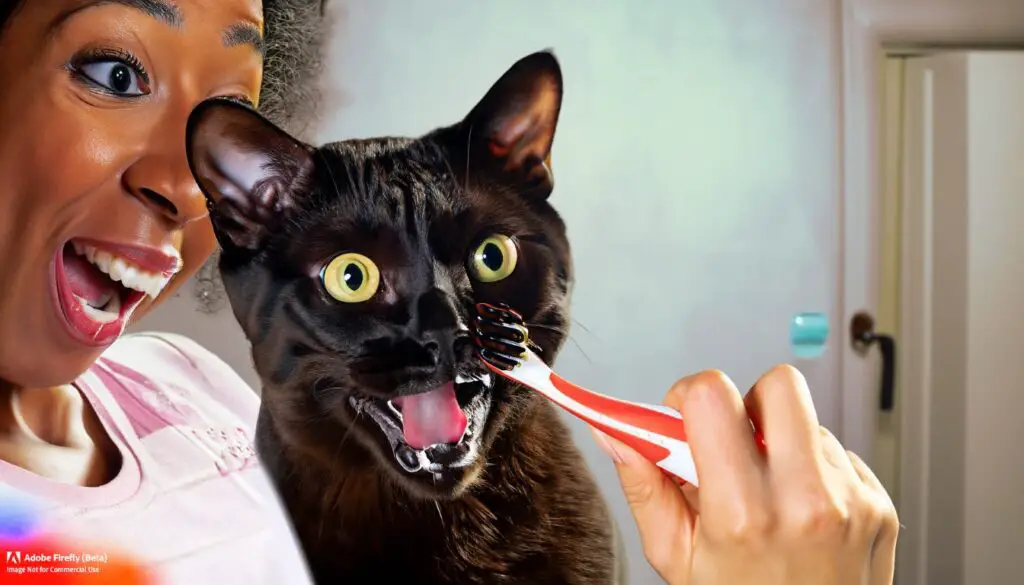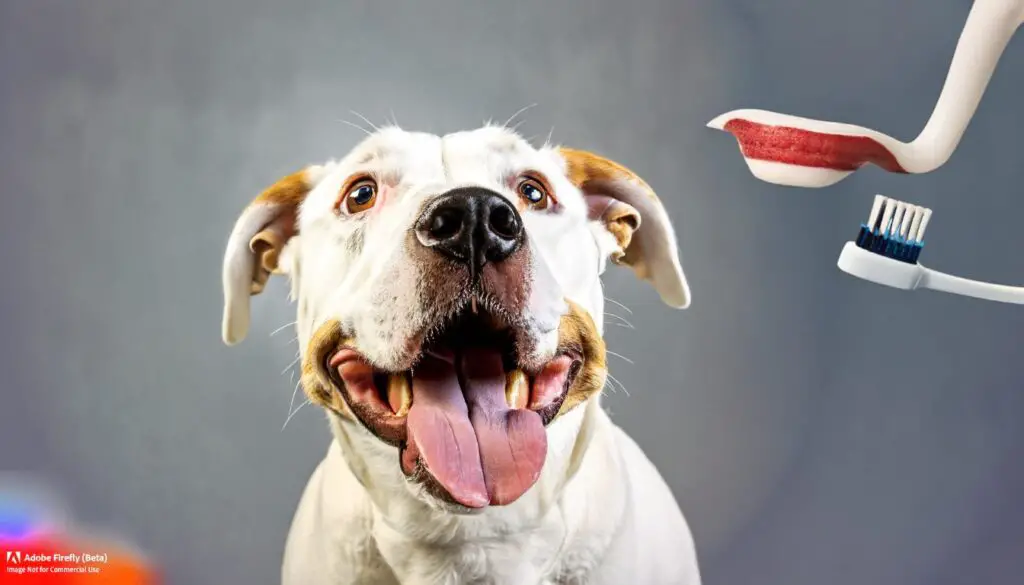
Can I use human toothpaste on my pet dog and cat? This is an often-asked question by pet owners, especially first-timers. Pet owners who want to ensure the dental health of their furry companions are often confused about toothpaste usage. While some medications prescribed for dogs are sourced from human pharmacies, it doesn’t apply to toothpaste. Some pet owners may share their daily routines and products with their pets, but when it is about toothpaste, it can pose health risks. Therefore, the clear answer to “Are Human Toothpaste Safe For Dogs, Cats, and Pets?” is No. Join us as we focus more on the topic.
Human toothpaste can be highly hazardous for dogs due to not one but a range of reasons. Although certain human medications and supplements are safe for dogs, human toothpaste isn’t formulated for dogs. Pet’s dental health is often overlooked, but that doesn’t mean they cannot suffer from dental pain and infections. Therefore, per veterinarians’ advice, brushing the pet’s teeth twice to four times a week.
If you have a pet at home and are considering starting your brushing routine, we have something crucial for you to know. Firstly, stop using human toothpaste on your pets right away. And secondly, read on to know more about the potential dangers of using human toothpaste on dogs and cats.

Table of Contents
What Human Toothpaste Is Safe For Dogs?
No human toothpaste is safe for dogs. In fact, you should never use human toothpaste on dogs for several reasons. The list of ingredients and components used in the formulation of human toothpaste can be harmful to pets. Even though human and dog toothpaste has some common ingredients, the formulation as a whole can prove dangerous. When it comes to choosing a toothpaste for your dog, it is ideal to go for specifically formulated canine dental care products only. Here are a few key factors to consider when selecting toothpaste for your canine friend.
Things To Know While Choosing A Canine Toothpaste
- Pick a toothpaste that has a canine-specific formulation and is designed for pets only. It is ideal for browsing cat-specific or dog-specific toothpaste when buying one.
- It is important to ensure that the formulations are tailored to meet your pet’s unique oral care needs. Go for pet toothpaste that has non-toxic ingredients, preferably natural and safe toothpaste. In contrast, avoid ingredients like fluoride, xylitol, or artificial sweeteners since they can prove harmful to dogs.
- Pick toothpaste with flavors that appeal to your pet dog or cat. Pet’s commonly love flavors like poultry, beef, and peanut butter. Choosing the right flavor will make the brushing routine more enjoyable for the pet and easier for the owners. The right flavor will increase your pet’s cooperation.
- Tartar buildup can often be a dental issue in dogs. This chosen toothpaste offers tartar control benefits. Pet toothpaste with enzymes or additives can help you break down plaque and tartar.
- Instead of picking up a random product, always consult a veterinarian for toothpaste recommendations. A vet can guide you to the right toothpaste depending on your dog’s age, health, specific dental needs, and oral health conditions.
- Pick the toothpaste that is easy to use, is ideal for your pet’s comfort level, and works best for them.
- While buying pet toothpaste, always check the safety and quality standards set by regulatory bodies. Doing so is important to ensure that the toothpaste meets certain criteria and has undergone proper testing.
- Experiment with gel, powder, and paste-based toothpaste formulations to determine which your pet is most comfortable with.
- Choose a small-size toothpaste with secure packaging. Pets won’t need a large amount of toothpaste or toothpaste as regularly as humans. Therefore instead of buying a large one, go for a small one. It will help you keep the product fresh and use it before it might go bad.
So, Can I Use Human Toothpaste On My Cat or Dog?
No, it would help if you never used human toothpaste on your cat or dog. Human toothpaste, as its name suggests, is formulated for humans. It may contain ingredients that can be harmful to pets. The ingredients like Fluoride and Xylitol in human toothpaste can lead to gastrointestinal upset and liver damage in pets. Besides that, like us, pets cannot rinse and spit out toothpaste after brushing. They often swallow whatever is in their mouth and do the same with toothpaste. While pet toothpastes are specially formulated, keeping this in mind, human toothpastes are not. If your dog or cat is regularly swallowing human toothpaste, they may suffer from Fluoride toxicity soon.
Also, cats and dogs have different oral care needs compared to humans. Unlike humans, they are highly sensitive to dental issues like tartar, plaque, and gum disease. Considering that pets need toothpaste specifically formulated for their species. In fact, a canine toothpaste specially formulated for dogs isn’t ideal for cats. For cats, choose toothpaste formulated specifically for felines. Remember, cats have more sensitive dental systems than dogs, and thus, they are prone to high toxicity if human toothpaste is used.

Can Dogs and Cats Lick Human Toothpaste?
No, it is not recommended for Cats and Dogs to lick human toothpaste. Human toothpaste is formulated for humans’ dental and oral organs, and it doesn’t suit the digestive systems of dogs and cats.
A small lick or accidental ingestion of a little human toothpaste will unlikely cause harm to the pet. However, if the dog or cat has ingested a large amount of human toothpaste or licked it regularly, it can be dangerous.
My Dog Licked Human Toothpaste, What Should I Do?
If your dog has licked human toothpaste, here’s what you need to do:
- Access the situation and find out how much toothpaste the pet has licked/ ingested.
- Check for any immediate signs of discomfort or distress.
- Read the toothpaste label and find whether it contains any harmful ingredients, including fluoride, xylitol, or artificial sweeteners.
- Upon noticing any unusual health or behavior changes in your dog, contact your veterinarian immediately. However, if the dog has ingested a large amount of toothpaste, do not wait for any behavior change and reach a veterinarian as soon as possible.
Prevention is always better than cure; therefore, to avoid such a situation, always keep toothpaste out of your pet’s reach. Be it human or pet toothpaste, your dogs and cats must not have access to any of them by themselves.

Toothpaste Poisoning In Dogs – Symptoms, Causes, and Tips.
Toothpaste that contains Fluoride and Xylitol is toxic to dogs. Toxicities of any of these ingredients can rapidly affect canines’ health. Xylitol is a sugar substitute commonly found in various products, including toothpaste.
Pets consuming Xylitol can drop their blood sugar levels (hypoglycemia) dangerously. It can also lead to liver necrosis and liver failure in the worst cases. Toothpaste Poisoning is serious in dogs, and here’s more about the same:
Symptoms of Toothpaste Poisoning in Dogs:
- Vomiting
- Diarrhea
- Weakness or lethargy
- Loss of appetite
- Excessive drooling
- Abdominal pain or discomfort
- Tremors or seizures
- Increased thirst and urination
- Rapid breathing or difficulty breathing
- Changes in behavior or coordination
Causes/ Reasons for Toothpaste Poisoning in Dogs:
- Xylitol, most commonly present in sugar-free toothpaste, leads to dog toothpaste poisoning. It by dropping the blood sugar levels rapidly can lead to hypoglycemia.
- Fluoride content in toothpaste can lead to fluoride toxicity in dogs. This type of poisoning can result in gastrointestinal upset, tremors, and seizures.
- Some toothpaste with harmful substances like artificial sweeteners or detergents can lead to dog poisoning.
Tips for Preventing Toothpaste Poisoning in Dogs:
- Always use toothpaste specifically formulated for dogs. Due to their special formulation, they, if ingested, are safe for dogs.
- When buying toothpaste for dogs, please read the ingredient list and ensure they are safe and free from toxic substances.
- Always keep toothpaste and similar products away from your dog’s reach to prevent accidental ingestion.
- Upon suspecting toothpaste ingestion in your dog or monitoring any signs of poisoning, contact your veterinarian immediately. Inform your doctor about the type of toothpaste and the amount of ingested.
Best Pet Toothpaste in 2023
Virbac C.E.T. Enzymatic Toothpaste

Virbac C.E.T. Enzymatic Toothpaste is a safe and effective option for dog dental care. It comes in multiple flavors, utilizes dual enzymes to combat plaque, and provides ongoing action even after brushing.
Petsmile Professional Pet Toothpaste
Petsmile Professional Pet Toothpaste is a dog-friendly toothpaste with flavors like London Broil and Rotisserie Chicken. It’s odorless, uses Calprox, and is approved by the Veterinary Oral Health Council for reducing plaque and tartar.

Dog Toothbrush and Toothpaste Brushing Kit
The Paws & Pals Dog Toothbrush and Toothpaste Kit offer beef-flavored toothpaste, multiple brush styles, and thick enzymatic toothpaste for effective dental care. It provides various application options and has helped improve breath odor. The kit includes a fingertip brush and a dual-headed toothbrush with soft bristles for gentle brushing.

Vet’s Best Enzymatic Dog Toothpaste
Looking for a cost-effective option? This veterinarian-designed gel toothpaste with baking soda and enzymes fight plaque and tartar. It has a fresh scent and favorable reviews from pet owners for freshening breath and whitening teeth. It’s suitable for dogs and cats, recommended by vets, and available in different flavors.

What Can I Use Instead Of Dog Toothpaste?
As an alternative to dog toothpaste, there are quite a few products to use. Here are our recommendations for the same:
- Dog tooth wipes are made using safe ingredients and can be used to wipe your dog’s teeth and gums.
- Dog dental sprays reduce plaque and tartar buildup and freshen breath.
- Or, prepare dog-appropriate toothpaste at home using safe ingredients.
However, remember none of these alternatives may be as effective as a dedicated dog toothpaste. You can use them as a change, but avoid including them in your dog’s dental care routine.
Wrapping up…
Overall, human toothpaste is not safe for dogs, cats, and other pets. Human toothpaste can have toxic ingredients and may not suit a dog’s oral care needs. Use pet-specific toothpaste only.

Hi, This is Lyn, I suffer from dental sensitivity for a very long time. PowerToothpaste.com is where I share my views of various toothpaste brands, along with tips on how to use toothpaste and what to look for when purchasing.
